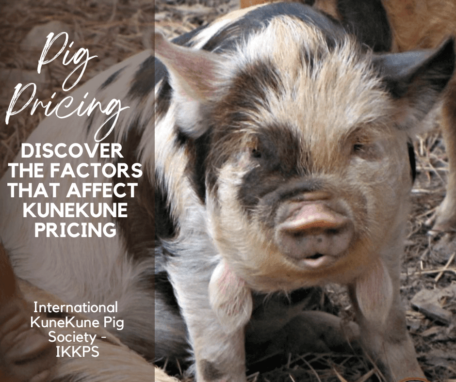
Sign Up
Want to receive a newsletter to learn more about KuneKune pigs and other educational information? Sign up to have them delivered right to your inbox.
We look forwarded to sending you some great info.
Pricing of KuneKunes
KuneKune Pig Prices: How Much Should You Expect to Pay?
KuneKune pig price - How much do KuneKune pigs Cost? Are you considering adding a KuneKune pig to your farm or homestead? Understand the price of KuneKune pigs. Discover the factors that impact KuneKune pig prices and make an informed decision.

KuneKune Prices: Factors That Affect the Cost
If you're considering adding a KuneKune pig to your farm or homestead, it's important to understand the costs involved. How much do KuneKune pigs cost? KuneKune pig prices can vary depending on a variety of factors, including age, location, gender, breeder reputation, and breeding status. In this guide, we'll explore the various factors that can affect KuneKune pig prices and help you make an informed decision about whether these adorable pigs are right for you.
KuneKune Bloodline.
The bloodline of a KuneKune pig can impact its price. Purebred KuneKune pigs with a strong bloodline can be more expensive than crossbred pigs or those with less desirable bloodlines. So, learning the KuneKune bloodlines can help you.
Andrew, Te Whangi and Jenny are among the first to enter the USA. Therefore, they are heavily populated as they have been used in many breeding programs. As a result, you can expect to pay less for those bloodlines. Likewise, some of the
newer bloodlines you would expect to pay more for. Such as the British imports and even some of the NZ imports. Some of these lines are
Momona, Haunene, Tarutaru and Whakanui.
The point of using dummy text for your paragraph is that it has a more-or-less normal distribution of letters. making it look like readable English.
BH Rebecca Gina
There are some bloodlines that although they were not new, they tend to be “forgotten” or more controlled bloodlines. For example, BH Rebecca Gina. The import died early on and most of that line was “controlled” to a degree but, strategically placing females from that line very selectively. So BH Rebecca Gina is the rarest of the female bloodlines. They originated from the UK. However, the Rebecca Gina has been here for many years. The importer wanted to distinguish the newer Rebecca Gina from the older one so, it was agreed that the breeder’s initials would be placed in front of the bloodline name to show this as a bit different from the original Rebecca Gina. BH stands for Barton Hill.
Tutaki
Another example is the Tutaki. While they have been here for many years, they tended to be a much bigger big with a more moderate snout length. Therefore, they were not heavily produced from. Especially once the new and improved ones called BH Tutaki were released from another import from the UK. As a result, the Tutaki fell by the wayside and has just recently returned more improved. So, Tutaki is the rarest of the boar lines.
Tutanekai
Some will say that the Tutanekai is the rarest but, as we know from studying the bloodlines that is a Mahia Love renamed. IKHR has always registered them as a separate line. IKKPS recognized them as Tutanekai from their inception. It was the American KuneKune Pig Society that renamed them to the Mahia Love TF. Just
Recently after IKKPS arose that decision was repealed, and they will now be doing the Tutanekai line instead of the Mahia Love TF. If they rename all the past ones, we will really begin to see how many there truly are of that line.
Kune colors
Additionally, rare color variations or patterns can also increase the price of a KuneKune pig. There is a fad at this time for the high percentage white, belted and banded pigs. This was not a normal pattern for KuneKunes. There was a recent conversation in the UK about determining where this came from. It came
from an unregistered pig in New Zealand. It is important to note that in NZ, it was customary for unregistered KuneKunes to be registered by inspection.
Someone would see the pig in person and deem it purebred and then register it. There is much speculation of why the pig that introduced the belts was not registered by inspection. Some say it was not a KuneKune at all and that is why it was never registered. Of course, it is speculation at this point.
Regardless the USA has taken a favor to these colorful pigs, and many are breeding for this coloring pattern. It is said to be a dominant trait. Therefore, as with most fads, it does sell at a higher price.
It's important to research the bloodline of the pig you're interested in to determine its value. You can do this by getting to know the bloodlines and what is older and what is newer. IKKPS offers a cheat sheet on the website showing all the lines, what they trace back to if any and when they first appeared.
Age and Gender.
The age and gender of a KuneKune pig can also affect its price. Younger pigs, such as piglets, are less expensive than older pigs. Female pigs may also be more expensive than males, as females can be used for breeding purposes and have a higher demand. However, if you're looking for a pig as a pet or for meat production, gender may not be as important as other factors such as temperament and health. For pets, you can save money by purchasing a barrow (a neutered male). Most importantly, please remember that a KuneKune is a herd animal, and you will need two pigs for them to be genuinely happy.
Breeding Status
As you may expect, breeding KuneKune will cost more than a pet or meat animal. Likewise, some sows are sold breed. This means that they have been exposed to a boar and in some cases, several boars. They could be pregnant, or they may not take. It is a risk purchasing a bred sow unless pregnancy has been confirmed. You can of course expect to pay more for a sow that is “in pig”. Your return on investment is much shorter purchasing a bred female of course which is another reason that the cost of purchasing a bred sow is more expensive.
Here is something important to consider, if the pregnancy is not confirmed there is a chance that due to the stress of being re-homed, the sow may abort her litter. So, please be careful when purchasing an unconfirmed pregnant female.
Size and Weight.
Another factor that can impact the cost of a KuneKune pig is its size and weight. Larger pigs will be more expensive than smaller pigs, as they require more food and resources to raise. Additionally, pigs that are bred for meat production may be sold at a higher price if they have a larger size and weight. However, if you're looking for a pet pig, a smaller size may be more manageable and cost-effective.
Health and Vaccinations.
The health and vaccination status of a KuneKune pig can also impact its price. Pigs that have received all necessary vaccinations and have a clean bill of health from a veterinarian may be sold at a higher price than pigs that have not. This is because healthy pigs are less likely to require costly medical treatments and are more desirable to buyers. Additionally, some breeders may offer a health guarantee or warranty for their pigs, which can also impact the price.
Location and Availability.
Another factor that can impact the cost of a KuneKune pig is its location and availability. Pigs that are located in areas with high demand and limited supply may be sold at a higher price than pigs in areas with lower demand and higher supply. Additionally, if a breeder has a limited number of pigs available for sale, they may be able to charge a higher price due to the scarcity of the available stock in that area. It's important to research the availability and pricing of KuneKune pigs in your area before making a purchase.
Where to Find KuneKune Pigs for Sale.
If you're interested in purchasing a KuneKune pig, there are several places to look for breeders. One option is to search online at the registries breeder’s list for KuneKune pig breeders in your area. For IKKPS, we have two breeder’s list. One is on the website and then a more detailed one is in the online herd book. Utilizing the
IKKPS herd book not only can you research the bloodlines that breeders have available but, there is a for sale section that will show all pigs for sale and all the recent litter. This is extremely helpful if you are looking for certain bloodlines.
Additionally, in the herd book, you can view pedigrees and photos of the pig’s ancestors that you are considering for purchase. This is extremely helpful to potential buyers. IKKPS is the only KuneKune Registry to offer this feature of seeing pictures within pedigrees. Over time there will be even more photos within the pedigrees.
You can utilize google by doing searches for KuneKune breeders. A popular search is KuneKunes for sale near me. Another option is to join KuneKune pig groups on social media or forums to connect with other pig owners and breeders. When looking for a breeder, be sure to ask about their breeding practices, the health of their pigs, and any guarantees or warranties they offer. It is important that you get a sales contract as well.
Tips for Negotiating the Best Price.
When it comes to purchasing a KuneKune pig, it's important to know about pricing. In general, most KuneKunes cost $500 - $1000. Barrows, which are neutered males, you can expect to pay around $350 plus the cost of neuter.
Research the average prices for KuneKune pigs in your area and use that information to make informed decisions in purchasing with breeders. You can also ask about any discounts or promotions they may be offering, such as reduced prices for multiple pig purchases. Additionally, be sure to ask about any additional costs, such as transportation fees or veterinary expenses, which may be associated with purchasing a KuneKune pig.
Most breeders will include the cost of registrations, DNA, vaccinations, permanent identification, and deworming cost into a single price for the piglet.
Budgeting for the Cost of Owning a KuneKune Pig.
When considering purchasing a KuneKune pig, it's important to budget for the ongoing costs of ownership. In addition to the initial purchase price, you'll need to factor in the cost of food, shelter, and veterinary care. While KuneKunes in general are a very hardy breed it is important to have found a vet that is knowledgeable about KuneKune pigs in case of an emergency.
KuneKune pigs are known for their love of grazing, so you may be able to save money on food costs by allowing them to graze on pasture. However, you'll still need to provide them with supplemental feed and ensure they have access to clean water. It's also important to budget for unexpected veterinary expenses, such as vaccinations or emergency care. By budgeting for these costs ahead of time, you can ensure that you're able to provide your KuneKune pig with the care they need to thrive.
In conclusion
The point of using dummy text for your paragraph is that it has a more-or-less normal distribution of letters. making it look like readable English.
As you can tell there are many factors that go into pricing KuneKune pigs. Location, age, gender, vaccination status and more. We hope that this article is helpful to you as you budget and save for having KuneKune pigs on your farm and homesteads.
Registry Office
17500 Hamilton Arms Court Dewitt, VA 23840